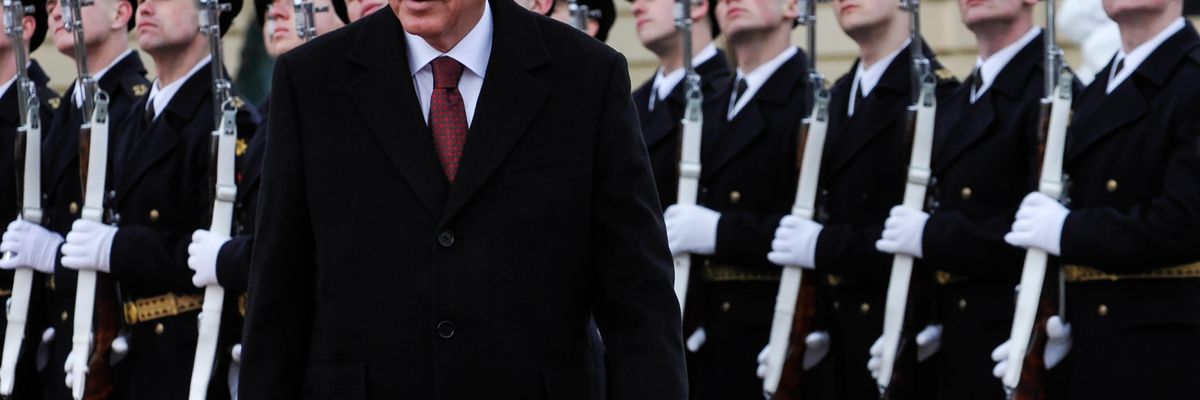Turkish President Recep Tayyip Erdogan has endorsed Hamas and doubled down on his criticisms of Israel’s conduct, further straining transatlantic unity on the Israel-Hamas war as Tel Aviv reportedly gears up for a large-scale ground operation in Gaza.
"Hamas is not a terrorist organization, it is a liberation group, 'mujahideen' waging a battle to protect its lands and people," Erdogan told lawmakers last week, using an Arabic word that refers to those engaged in a holy struggle.
"The perpetrators of the massacre and the destruction taking place in Gaza are those providing unlimited support for Israel," he added, according to Reuters. "Israel's attacks on Gaza, for both itself and those supporting them, amount to murder and mental illness."
It is unclear if there is a strong domestic rationale for Erdogan, who has occupied a shaky political position since eking out a hard-fought victory in the Turkish presidential election earlier this summer, to occupy a position overtly in favor of Hamas. What little polling data there is on Turkish attitudes toward the Israel-Hamas War suggests that only a sliver of the population — as little as 11% — believes Turkey should intervene on the side of Hamas, with a plurality of respondents saying Turkey should remain neutral in the conflict.
Foreign policy concerns perhaps paint a more convincing picture of the Turkish leader’s priorities: Erdogan’s latest perspective on Hamas, while anathema to many Western audiences, enjoys widespread purchase across the Muslim world. Though delivered in too haphazard and inconsistent a fashion to comprise a coherent strategy or policy platform, pan-Islamist messaging has long been a part of Erdogan’s rhetorical toolkit.
Erdogan’s full-throated endorsement of Hamas also complements his populist image at home. Large-scale demonstrations taking a stance explicitly critical of Israel have erupted in Turkey — as with many Middle-Eastern countries — since October 7, including reports of fireworks and rocks flung at the Israeli consulate in Istanbul.
Erdogan’s stark statement is not without potential consequences. Not unexpectedly, Israeli officials have denounced the remarks: “Israel wholeheartedly rejects the Turkish President’s harsh words about the terrorist organization Hamas,” Israeli Foreign Ministry spokesperson Lior Haiat said in a statement. “Even the Turkish president's attempt to defend the terrorist organization and his inciting words will not change the horrors that the whole world has seen,” Haiat added.
Erdogan further announced he canceled an upcoming visit to Israel, suggesting that fledgling efforts by Turkish and Israeli officials to normalize relations between the two countries in 2022 are indefinitely suspended if not dead. This dramatic reversal of positive diplomatic momentum follows the suspension of normalization talks between Saudi Arabia and Israel, a process that Erdogan supported prior to the October 7 Hamas attack on Israel.
Ankara has likely abrogated its standing as a mediator in any potential future negotiations between Israel and Hamas by fully siding with the latter, drawing a vivid contrast with Erdogan’s delicate messaging and ironclad commitment to neutrality in the ongoing Russia-Ukraine war. But the move is on brand for Erdogan: The Turkish leader is no stranger to breaking with his western NATO allies on key global issues and pursuing policies directly at odds with the strategic objectives articulated by U.S. and European Union leaders.
His recent actions suggest that he currently prioritizes growing his clout in the Arab and Muslim worlds over any prospective program of rapprochement with Israel, dealing yet another blow to the Biden administration’s troubled vision of a Middle-Eastern security architecture that promotes productive, healthy relations between Israel and several key regional players.
Yet a core part of Erdogan’s modus operandi is a kind of ruthless pragmatism characterized by constant maneuvering and, occasionally, drastic policy reversals. The Turkish President, ever flexible in pursuit of his policy aims, may possibly seek to restart normalization talks under more propitious circumstances when the Israel-Hamas war ends. Whether Israel opts to reciprocate such advances is another question entirely.
Erdogan’s most recent challenge comes even as the Euro-Atlantic united front on Israel shows signs of fraying much closer to its core. As observed in RS by Eldar Mamedov, Europe’s shared messaging against Hamas and in favor of Israel belies growing policy differences as the conflict enters a new, volatile phase.
Josep Borrell, the EU’s top diplomat, has floated a “humanitarian pause” with the aim of providing succor to civilians in the Gaza strip. Germany and Austria are opposed even to this pared-down plan, which falls short of the formal ceasefire proposed by UN Chief Antonio Guterres last week. Top Spanish and Irish officials, meanwhile, have called for a humanitarian ceasefire, outlining the contours of a policy rift that could intensify if the Israel Defense Forces (IDF) proceed with a large-scale ground campaign in Gaza.
Erdogan's posturing on Hamas, tactical as it may be, underscores a larger pattern of mounting tensions between Israel and many key regional actors in the wake of the October 7 attack. As Tel Aviv hunkers down for what Israeli Prime Minister Benjamin Netanyahu said will be a "long and difficult war,” there is a non-insignificant risk that these tensions could boil over into a larger regional conflict.
It is difficult to imagine circumstances in which Turkey, which does not share a border with Israel and does not have existential security interests at stake, would get directly involved, but Erdogan’s enmity contributes to an ominous regional mood that may embolden neighboring leaders who are already being pressured by protesters at home to assume a more active role in the conflict.
















